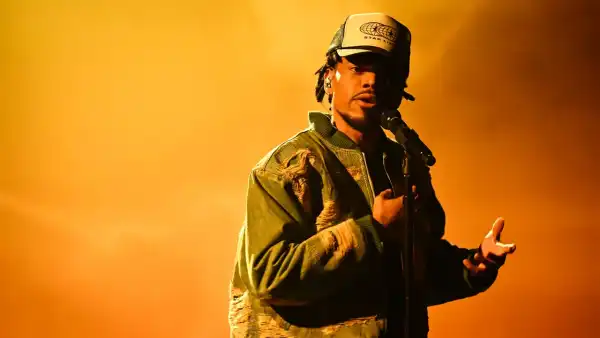
Save this storySave this storySave this storySave this story
When Chance the Rapper declared, “I met Kanye West, and I will never fail,” on “Ultralight Beam,” the opening track of West’s 2016 album The Life of Pablo, the words felt like an undeniable truth. At the height of his cultural dominance, West had hand-picked the Chicago native as his successor—an embodiment of the spiritual, God-inspired hip-hop he championed in the mid-2000s. Already a standout among the genre’s young stars, Chance emerged as a savvy poet whose rap lines and melodic vocals flowed together, his raspy voice gliding masterfully over beats that straddled gospel and blues, jazz and R&B, drill and funk. He became the voice of a generation — an earnest, politically engaged artist whose father worked for Senator Barack Obama and whose lyrics touched on going to church with his grandmother. At the same time, he did not shy away from street romance: he smoked non-stop, experimented with LSD, drove around Chicago with a gun on his belt, dropped out of school, while remaining carefree. His early works — the mixtapes 10 Day (2012), the cult Acid Rap (2013), and the album Surf (2015), a joint album with the group The Social Experiment — received almost unanimous recognition. After a verse on Ultralight Beam, Chance released Coloring Book, a mixtape that instantly conquered the public and brought him a Grammy. It seemed that failure was impossible. How else? At twenty-three, he ruled the world.
As recent years have shown, being associated with West is no guarantee against ruin; these days, it’s almost a guarantee. In the decade since “Pablo,” West, who changed his name to “Ye,” has endorsed Donald Trump and expressed sympathy for Hitler; his new tracks have promoted Nazism and have been censored on streaming sites. Chance, meanwhile, has experienced his own, different kind of downfall. After “Coloring Book,” his team got MTV News’s negative review of the concert removed, sparking a wave of criticism. Later, defending his mentor after his Trump endorsement, Chance tweeted, “Black people don’t have to be Democrats,” before recanting and apologizing. He’s become the face of Kit Kat and Doritos, creating jingles that border on his music. In 2023, he joined NBC’s The Voice as a mentor, a role more often filled by artists from past eras. While these moves seem minor compared to the scandals of other stars, they exposed contradictions in Chance’s work, and perhaps in him. He used to pride himself on his independence, writing songs about refusing label contracts and resisting corporations. Where had those principles gone? What did he believe in now?
Since “Acid Rap,” Chance has increasingly taken on a moralizing role, extolling prayer, fidelity, and family values to an audience that initially came to him for songs about acid trips. In 2019, he alienated fans with the wedding-themed album “The Big Day.” As Gia Tolentino noted in The New Yorker in an essay about “my wife” memes, “Overly obsessing over a romantic partner guarantees online ridicule.” Ignoring this, Chance has become the target of vitriolic memes, including the parody track “I Love My Wife.” (The joke, like the snack jingles, simplified his image, doing more damage than its own mistakes.) His music has always veered between melancholy and naivete, cliché and originality: a brilliant nod to the Arthur theme song, for example, turned into a clumsy performance with the Sesame Street Muppets. “The Big Day” tipped the scales toward bad taste, offering shallow gospel rap without the depth it once had. YouTube critic Anthony Fantano gave the album a 0/10; Rolling Stone listed it as one of its biggest disappointments. “It feels like fans are waiting for me to kill myself,” Chance wrote in response to the hate. Failure is an initiation for a pop star, not an end. But his words showed he wasn’t prepared for the blow.
Six years later, Chance is back with Star Line, which dropped last week. Since its announcement in 2022, he has been quietly promoting the project, avoiding media noise. He has released little-noticed singles, organized a festival in Ghana, and held private evenings at museums in New Orleans and Miami. The only news that has blown up social media is his divorce. For many fans, Chance remains “that romantic” who recorded an album about family happiness. The breakup was a piquant twist of fate. Will he be able to avoid public bullying? Will he regain respect as an artist? Star Line is intended to reintroduce the world to a more mature Chance.
If “Coloring Book” and “The Big Day” reflected youthful confidence, “Star Line” finds the 32-year-old rapper coming to terms with the uncertainty of adolescence. Where once he was driven by faith in God and marriage, now he questions everything—fame, fans, friends, church. But his skepticism hasn’t turned into cynicism: He still searches for light in dark corners. (The title is a nod to Marcus Garvey’s Black Star Line, a project that combined liberation struggle and utopianism.) On “Just a Drop,” he paints a picture of the slums—lack of water, decrepit housing, the cycle of poverty—but celebrates local solidarity: “We need room for a porch and a stoop/To lean out and start a revolution.” “Letters” castigates megachurches, calling for us to “kill the giant” of commerce and return to a faith that can’t be bought. These tracks are a reminder of why Chance is a star: he still knows how to inspire.
The problem with “The Big Day” is its narrowness. “Star Line” is broader: on “No More Old Men,” he muses on respecting elders whose struggles are forgotten by the young: “The Chi don’t dance anymore / The kids don’t stand a chance / They don’t save the old man / Soon they’ll be gone.” The song ends with a paean to ancestral wisdom. On “Speed of Love,” he quotes his father’s advice—“These are Harvard lectures”—or offers his own personal growth advice. His philosophy balances personal responsibility and social justice: systems are broken, but “there is light”—in God, in family, in the traditions of the black community.
It’s curious that “Tree” is the lead single, despite the stronger tracks. (The Joey Bada$$-featuring “The Highs & the Lows” came out in 2022.) “Tree,” which samples India Ari’s “Video,” could have been a hit, but it flounders thanks to Chance’s disharmonious chorus and Lil Wayne’s limp verse. The other tracks also fail to live up to their potential: “Space & Time” feels like a cartoon soundtrack, and “Gun in Yo Purse” unconvincingly portrays him as tough. But the album as a whole is cohesive, a reminder of Chance’s greatest talent: creating multifaceted worlds. His sound—a mix of ’90s soul, sampled hip-hop, and Afrodiasporic music—remains unique. He weaves in Richard Pryor monologues, builds beats around choir vocals, and writes lines that demand repeated listenings. “Star Line” is a return to his roots, a reminder of why Chance became a phenomenon.
Particularly powerful are the moments where Chance examines himself. On “Back to Go,” he describes the difficulties of juggling parenthood and a career: “It takes two, but I’m on the other end / Screaming into the phone like a dog who lost a bone.” And on the finale, “Speed of Love,” he examines his own downfall. Using an Erykah Badu quote—“Friends, fans, artists, who am I?”—he asks: Was the early love from fans genuine? Why did it go away, and why does it hurt? As always, he’s not giving up: “Tough guy confidence is hard to break,” he declares. There’s every reason to be angry, but he keeps smiling. ♦
Sourse: newyorker.com






